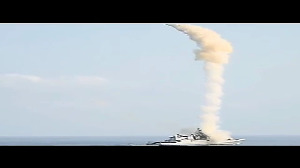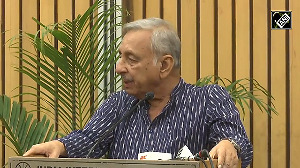
How can JK Tyres stay ahead of the pack? For years it has been the only Indian manufacturer which produced truck and bus radial tyres in sizeable quantities.
Now, Indian fleet owners are switching to radials -- and the competition in the industry is, inevitably, speeding up.
That's why JK is pulling out the stops to make sure it stays in front. It's putting together a big ad budget to ensure high visibility in the marketplace.
And, to reach out to customers, it has also established a network of 14 radial tyre care centres along highways. That should rise to 20 by this year-end, and 100 in five years time.
But JK won't have the road to itself any longer. Delhi-based Apollo Tyres has tied up with Michelin to carve out its place in the market. It's ambitiously talking about importing 15,000-20,000 truck and bus radial tyres this year.
By the first quarter of 2005, it is slated to invest $75 million in a plant that will have the capacity to make 300,000 to 350,00 commercial vehicle radials per annum.
Similarly, MRF has also put together a Rs 150 crore (Rs 1.50 billion) expansion plan. Market analysts reckon that a substantial part of this will be used to build capacities in commercial vehicle radials.
JK Tyres isn't standing still as the newcomers come racing down the highway. The company has an 80 per cent market share in the replacement sector which has grown by 100 per cent in the last one year.
Now it is investing about Rs 50 crore (Rs 500 million) for a 46 per cent capacity addition at its Mysore plant. "There is explosive potential for the segment. But a lot will depend on how the manufacturers and marketers develop and grow the market." says Ajay Kapila, director, marketing, J K Tyres.
There's one extraordinary feature about the Indian commercial vehicle radial tyre industry: it's tiny compared to other parts of the world. Only about 2 per cent of the trucks and buses on Indian roads run on radials.
Contrast that to other parts of the world. In the West, about 80 per cent of the trucks and buses on the road are fitted with radial tyres.
Similarly, in south east Asia about 65 per cent to 70 per cent of the commercial vehicles run on radials. Closer home, about 35 per cent of Pakistan's commercial vehicles are 'radialised'.
Why have Indian fleet-owners shied away from radial tyres? Firstly, they were perceived as being too expensive because the initial costs of buying the tyres are higher.
Most importantly, there's the issue of overloading that plagues the truck industry. That means that a 10-tonne truck is often carrying a load of around 15 tonnes. Radials don't cope with overloading as well as the older biased tyres.
Now fleet-owners are doing their sums once again. Commercial vehicle radials, depending on the brand, are 25 to 40 per cent costlier than biased tyres.
Today, an imported Michelin is the costliest radial in the Indian market (the landed cost of a 10.0020 Michelin is Rs 29,300). JK's ex-factory price is Rs 24,764, while MRF's it is Rs 20,872. The same size biased tyres cost around Rs 17,500.
But radials give better mileage and are more fuel efficient. Industry experts reckon that radials can give about 80 to 100 per cent higher mileage. In terms of fuel efficiency, the saving to the operator is estimated at 10 per cent.
However, these figures depend on factors like overloading and the quality of the roads. Combining the capital costs and the operating costs, one calculation is that the biased tyre costs about 14-15 paise per km, while the radial works out to only 9 paise per km.
"Radials for CVs are industrial products and their purchase will depend on the attributes they are able to deliver. High initial investment will not be the bottleneck," says Satish Sharma, chief, marketing, Apollo Tyres.
But the Indian commercial vehicle industry is changing in subtle ways and the tyre manufacturers believe this will lead to the fast growth of radial tyres. For a start there's the Golden Quadrilateral project and the better quality roads that will soon link different parts of the country.
Says Kapila: "Once the infrastructure is in place, a lot of marketing strategy will have to be deployed for the radialisation of the CVs in the country." Sharma adds: "Once the Golden Quadrilateral is ready the restrictions on overloading are bound to get more strict as it is detrimental to the high-cost maintenance of these roads."
Then, there are the new trucks and buses that are being rolled out of the factories. Volvo has led the drive into radialisation. Now, Ashok Leyland is also moving speedily into the new generation technology.
"We are looking at radials for some of our 'Newgen' buses and tractors," says K N Krishnamurthy, special director, customer service, Ashok Leyland. Only Tata Motors (the biggest player which has a 65 per cent market share) has been slightly slow about radialisation.
The tyre companies, for their part, have redoubled their selling efforts with the commercial vehicle manufacturers. JK is broadening its range of radials and post-expansion it will have a production capacity of 350,000.
It's already an OEM supplier to Volvo, Ashok Leyland and Tata Motors. Apollo-Michelin has its eyes more set on the after-market, though it is in talks with Volvo and has had some enquiries from Tata Motors and Ashok Leyland.
MRF too has been silently running its radials on trial with a select group of CV customers. It's reckoned that MRF makes between 200 and 500 radials per annum. The company hasn't made its radials available on the open market but it entertains enquiries through its dealers on a selective basis.
Of course, the commercial vehicle industry, has been through tough times during the last three to four years and it's only now that things are looking up and the operators have a bit of spare cash to pursue technological upgradation, say industry experts.
But the tyre companies, if they want to push radialisation in a big way will have to ensure that they can persuade the state transport corporations to make the switchover. The state corporations in Andhra Pradesh and Gujarat are showing interest in switching market sources.
"Buses constitute a smaller segment, which is largely institutionalised. This will facilitate faster transition to radials in the segment," an observer points out.
Currently about 9 million tyres are sold annually and the market is growing by about 9 per cent to 10 per cent per annum.
Industry experts calculate that radials will move from about 2 per cent of the market currently to about 5 per cent to 7 per cent by 2008. That would add up to about 594,000 tyres sold by 2008. Going further, the projections are that radials will constitute about 10 per cent of the bus and truck tyre market by 2010.
The industry will have to keep its foot on the accelerator if it wants to keep pace with that kind of growth. Most companies are still shying away from large capital expenditure.
Says Krishnamurthy: "The introductory phase is a slow one. The market acceptance takes time. Today, we have customers who insist that the radials do not make for good front tyres. The complaint is they do not have good road grip. But there is no scientific logic behind this perception."
MRF is the only indigenous maker of the radial tyres. But market observers say it has not been very serious in pushing radials for CVs. Apollo Michelin is banking heavily on the equity the international brand has in the market to stake its claim on the market.
JK Tyres, for its part, insists it's glad that other players are entering the market aggressively. "One player alone cannot develop the market," says Kapila. So, the race is bound to hot up in coming months.







 © 2025
© 2025